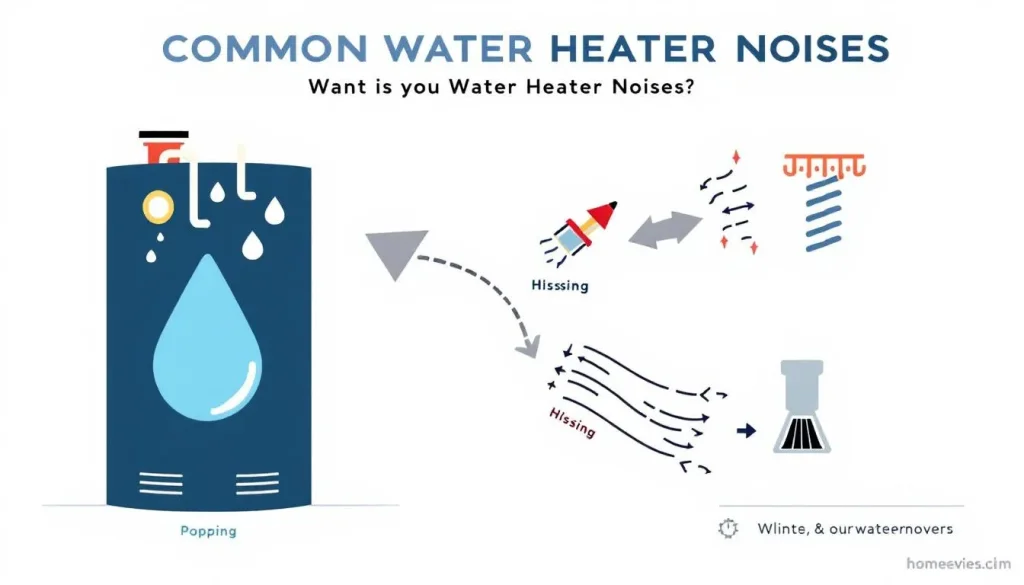Why Is My Water Heater Making Noise? Causes and Fixes With K L Plumbing
Contents
- 1 Why Is My Water Heater Making Noise? Causes and Fixes With K L Plumbing
If your water heater is making noise, you’re probably wondering, “Why is my water heater making noise?” Commonly heard sounds like popping, hissing, and banging can indicate various issues. This guide will explain what each noise means and how to address it.
Key Takeaways
Water heater noises like popping, hissing, and banging often indicate specific issues such as sediment buildup or leaks that require attention.
Regular maintenance, including flushing the tank and checking valves, can prevent many noise issues and prolong the lifespan of your water heater.
Persistent noises or leaks usually necessitate professional help to avoid more significant damage and ensure safe, efficient operation.
Understanding and maintaining your home’s water heater is essential for efficient operation and can help prevent future issues.
Common Water Heater Noises and Their Causes
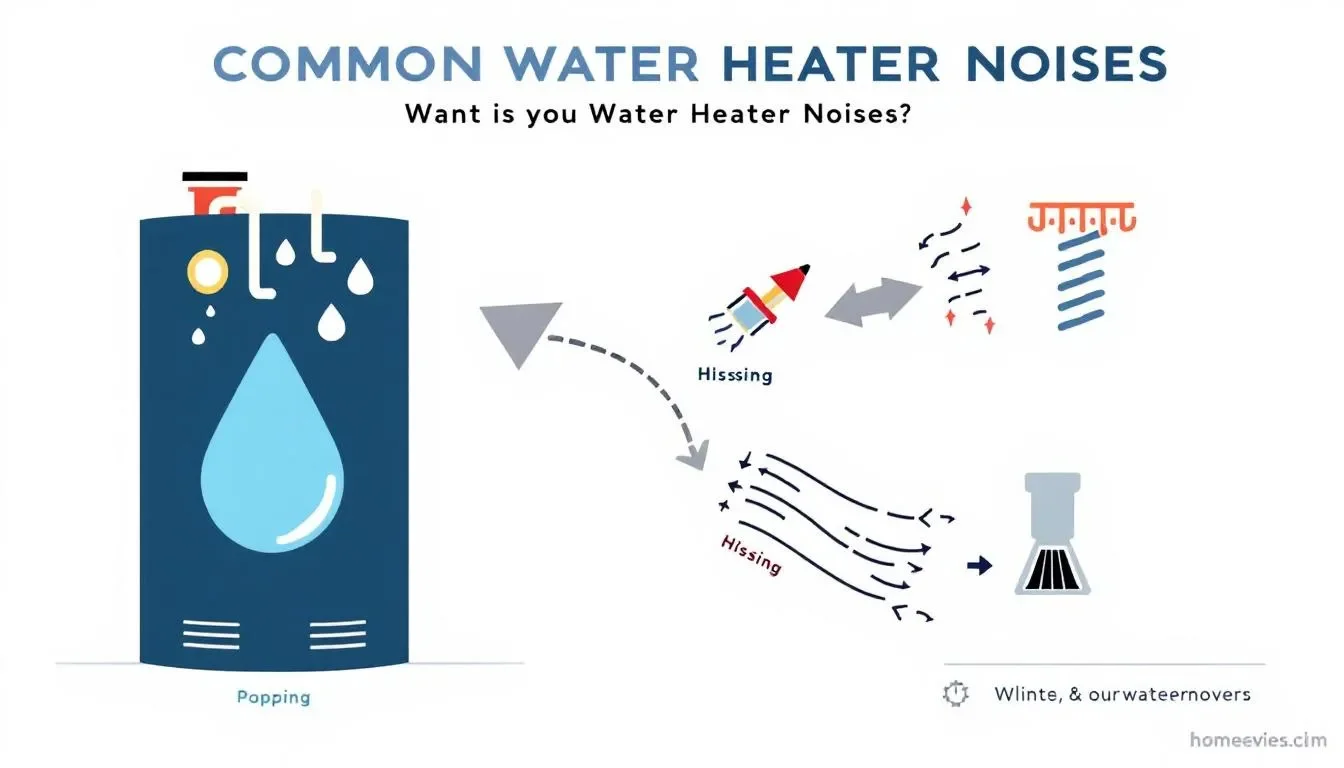
Water heaters, while essential for providing hot water, can produce various noises, each with its own cause. Common water heater noises include:
Popping
Hissing
Screeching
Crackling
Banging
Not all noises are a cause for concern—some are normal sounds of operation. However, strange noises that are unusual or persistent may indicate underlying issues and should be investigated further.
Gas and electric water heaters produce distinct sounds due to their unique operating mechanisms. Recognizing these noises and their causes helps determine if your water heater is functioning correctly or needs maintenance or repair.
Popping Sounds
A popping sound from your water heater usually indicates sediment buildup. Mineral deposits and sediment can accumulate at the bottom of the water heater tank, leading to popping noises as the water heats up and bubbles form. Trapped water beneath the sediment in the water tank can also contribute to these popping sounds, as pressure builds up and is suddenly released. This issue is common in both gas and electric water heaters.
Flushing your water heater regularly can prevent sediment buildup and associated popping noises. Living in an area with hard water may require more frequent tank flushing to manage sediment buildup.
Hissing or Sizzling Sounds
Hissing or sizzling sounds coming from your water heater may indicate a leak. These noises often occur when water leaks onto the heating element or burner, creating a sizzling sound as it evaporates. In electric water heaters, hissing sounds can also be related to water boiling around the heating elements.
If you hear sizzling sounds, check the pressure relief valve and relief valve for leaks or malfunctions, as issues with these valves can cause such noises and indicate potential safety hazards.
Ignoring these sounds can lead to significant leaks or water damage. If you hear hissing or sizzling sounds, it’s essential to investigate and address the cause promptly to avoid further complications.
Screeching Noises
A screeching noise from your water heater is typically caused by a partially closed inlet control valve. This restriction in water flow can create a high-pitched sounds, screeching sound as water is forced through a narrow opening, which may lead to a heater making noise.
Ensure the inlet control valve is fully opened to allow water to flow freely, eliminating the screeching noise and improving efficiency.
Crackling Noises
In gas water heaters, crackling noises typically result from excess condensation on the burner and generally resolve as the condensation dissipates, unless the noise persists.
A crackling sound is a common and usually harmless noise in gas-powered water heaters, often caused by condensation.
Banging or Knocking Noises
Banging or knocking noises in your water heater can be alarming. These sounds are often caused by sediment buildup inside the water heater tank, which can lead to water hammer effects. The noise occurs as water is forced through sediment buildup, creating pressure waves that can cause the tank to vibrate, resulting in a hammering sound. Such loud noise can indicate underlying issues that may require professional inspection.
Installing a water hammer arrestor can help alleviate banging or knocking noises. Regular maintenance and flushing of the tank can also prevent sediment buildup and reduce the occurrence of these noises.
Troubleshooting Noisy Water Heaters
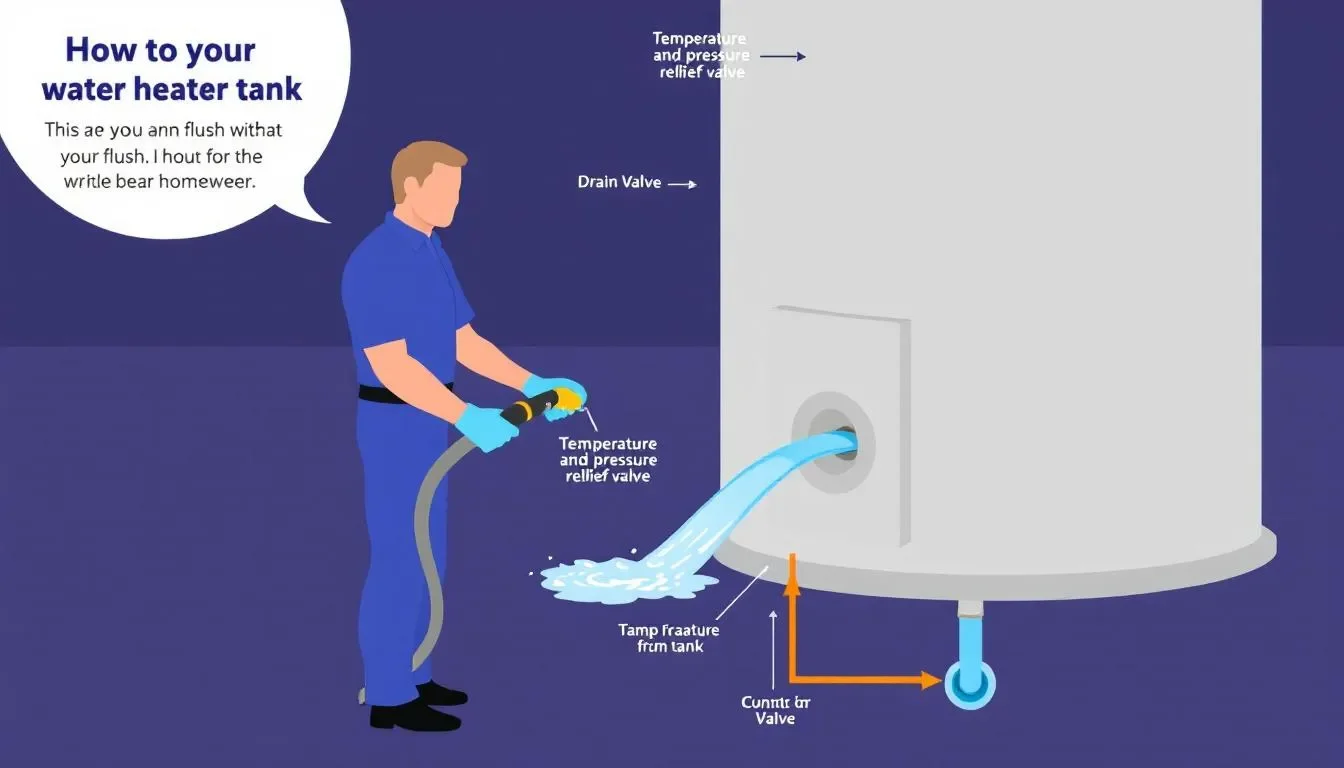
Homeowners can troubleshoot noisy water heaters by following specific steps to resolve common water heater issues. Regular maintenance prevents many issues and extends the lifespan of your water heater. Ignoring these noises can lead to more serious problems, such as leaks or complete system failure.
If your heater is making noises, following these troubleshooting steps can help identify and resolve the issue.
If unusual sounds persist after attempted fixes, seek professional assessment to prevent significant damage and costly repairs. Here are some steps you can take to troubleshoot noisy water heaters and strange sounds.
Flushing the Water Heater Tank
Flushing the water heater tank removes sediment buildup that causes popping noises and helps maintain performance.
Annual flushing is recommended, or every six months in areas with hard water, to improve heating efficiency and extend the life of your water heater.
In areas with hard water, installing a water purification system can help reduce sediment buildup in the tank.
Checking and Tightening Heating Elements
Loose heating elements cause vibrations and humming sounds. A loose heating element can create vibrations and humming noises during normal operation, so it should be checked and tightened. Tighten the heating element to stop humming and shaking.
A humming noise is usually not a serious issue.
Ensuring Proper Water Flow
Screeching noises from insufficient water flow can be alleviated by making noises to ensure all loose valves are fully open, promoting efficient operation and maintaining proper water pressure in the water system. The entry of cold water into the heater can sometimes cause humming noises due to vibrations.
Regularly ensure the inlet control valve is fully opened to maintain optimal water flow and performance.
Preventive Maintenance for Quiet Water Heaters
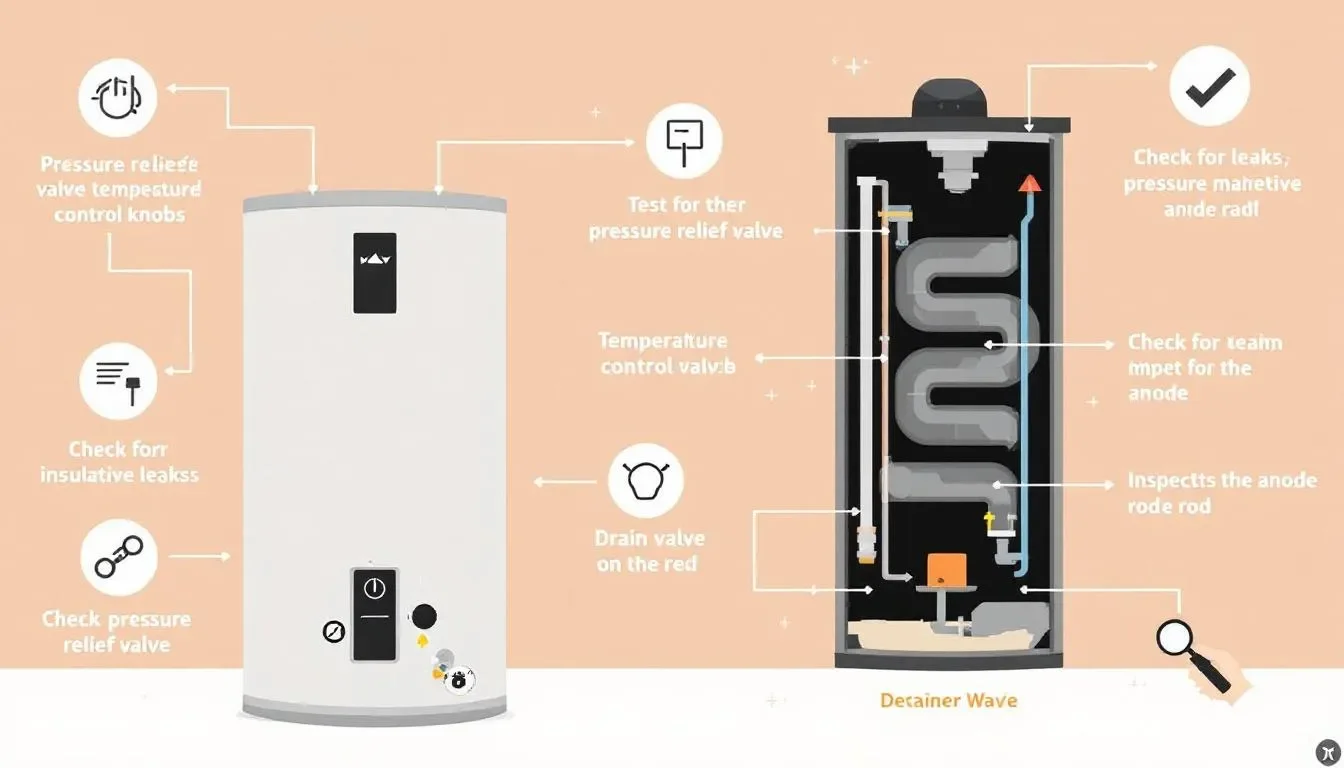
Preventive water heater maintenance keeps your water heater quiet and efficient. Regularly flush the tank, inspect valves and connections, and schedule professional inspections to prevent noise and extend its lifespan. Regular preventive maintenance is essential for maintaining your heater’s efficiency and reducing noise. Maintenance is key to avoiding increased energy costs and reduced hot water availability from inefficient water heaters.
Regular Flushing
Annual flushing prevents sediment buildup and eliminates excessive sediment buildup that can lead to performance issues. In areas with hard water, a professional flush may be necessary to manage built up sediment formation and excess sediment, preventing sediment build up.
It is recommended to flush the tank at least once a year to prevent popping sounds and maintain efficiency.
Inspecting Valves and Connections
Regular valve inspections prevent leaks and operational failures caused by inadequate water flow. Check pressure reducing valve for visible signs of wear or corrosion to ensure proper function.
If you hear ticking noises, inspect and consider replacing non heat trap nipples, as these can create a heat trap that leads to pressure fluctuations and noise.
Professional Inspections
Annual professional check-ups identify hidden issues before they escalate, ensuring safe and efficient operation by expert technicians.
Professional inspections are crucial for maintaining water heater safety and heater’s efficiency. Professional plumbing services can provide expert diagnosis and maintenance for noisy or malfunctioning water heaters.
When to Call a Professional Plumber
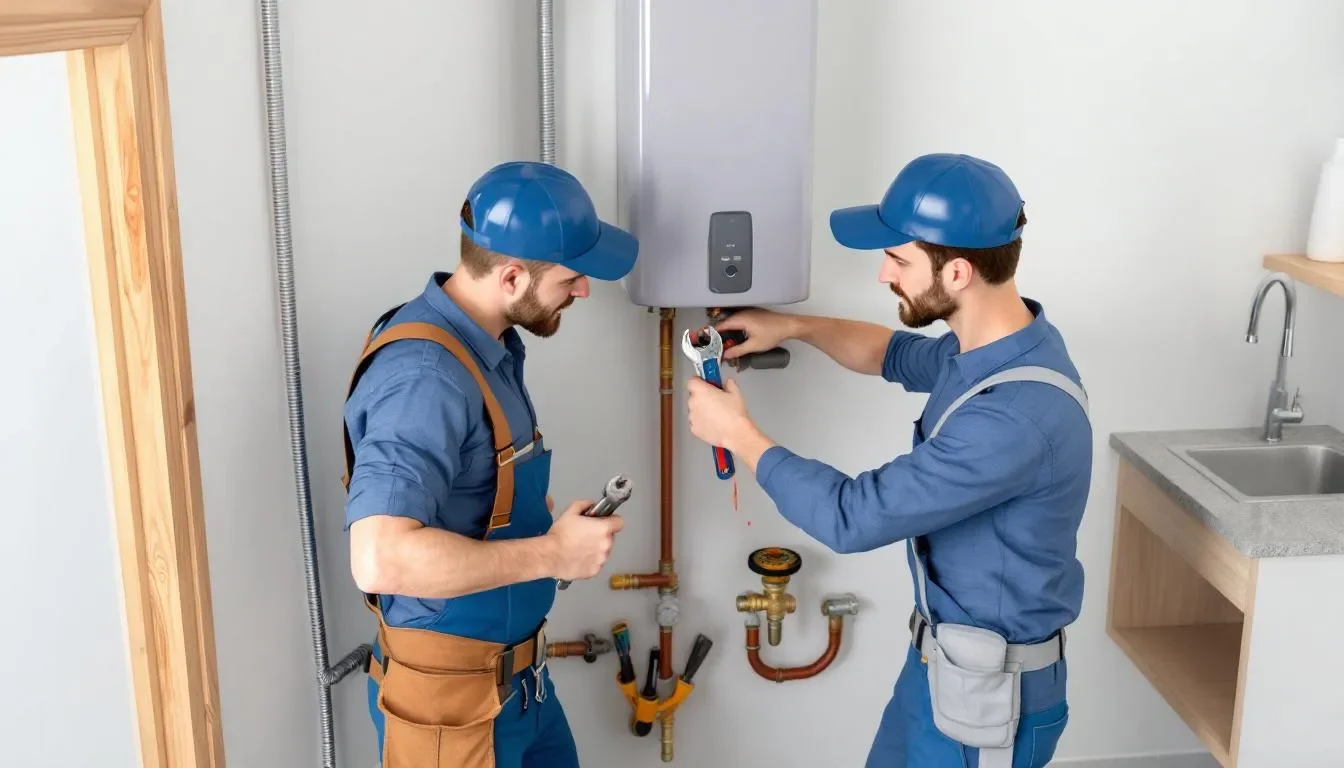
Although simple remedies can address noise issues, certain situations require professional intervention. Popping sounds, popping noise, leaks, and system inefficiency are signs that you should call a professional plumber. Professional plumbers conduct thorough inspections, diagnose complex problems, and ensure safe and efficient operation. If you experience persistent hot water heater issues, such as unusual noises or recurring problems, seeking professional help is especially important.
Persistent Noises After DIY Fixes
DIY fixes for persistent water heater noises often do not resolve the underlying issues. Common DIY troubleshooting includes flushing the tank or tightening heating element connections.
Persistent noises after DIY measures may indicate deeper issues requiring professional diagnosis and repair. Signs for professional help include leaks causing water damage or increased energy bills from system inefficiency.
Consulting a professional plumber ensures complex water heater problems and plumbing services are addressed safely and effectively.
Leaks and Water Damage
A leaking water heater typically requires immediate action or replacement to avoid significant damage. Look for water pooling at the base of the water heater, as this can indicate moisture build-up or leaks. Active leaks require immediate professional intervention to prevent further damage and safety hazards, especially if it’s a water heater’s issue. Water heater repair is essential in these situations.
Quickly addressing leaks safeguards your home and prevents costly repairs.
System Inefficiency
Regular maintenance prevents inefficiency, which increases energy costs and reduces hot water supply. Annual flushing removes sediment buildup, maintaining efficiency and extending the unit’s lifespan.
Regularly inspecting valves and connections helps avoid leaks and ensures effective operation. Professional inspections can identify potential issues early and perform thorough maintenance, enhancing efficiency.
Understanding Different Types of Water Heaters

Different water heater types have unique operational characteristics and noise levels. Water heater types may emit sounds ranging from ringing to hissing, each indicating specific operational conditions.
Understanding the differences between various hot water heaters is important for effective maintenance and troubleshooting, as it helps identify normal versus abnormal noises.
Understanding these differences helps identify perfectly normal operation versus potential issues, even if they are off by a few degrees.
Gas Water Heaters
Crackling sounds in a gas water heater may indicate moisture build-up and pooling water at the base. Gas powered water heaters often produce a crackling sound during operation due to condensation on the burner, which is usually normal. A humming noise in a gas water heater can result from a blockage in the combustion air inlet. A vibrating heating element can also produce a humming noise, requiring attention.
Common noises in gas water heaters indicate various issues, so understanding what each common sounds means is essential.
Electric Water Heaters
Electric water heaters commonly produce crackling and hissing sounds. Electric heaters may also produce humming sounds due to minor issues like a loose heating element. Crackling sounds may indicate a blockage in the heating element. Recognizing these sounds helps in diagnosing and resolving issues promptly.
An electric water heater offers benefits such as space efficiency and ease of maintenance.
Tankless Water Heaters
Tankless water heaters generally operate more quietly than traditional tank heaters. They are designed to minimize noise production. However, like all water heaters, tankless models can produce noise, though their characteristics differ from traditional models.
Overall, homeowners can expect tankless models to be quieter options for water heating.
Summary
Water heater noises can be a source of frustration and concern for many homeowners. Understanding the common sounds and their causes, such as popping, hissing, screeching, crackling, and banging, is crucial for identifying whether your water heater needs maintenance or repair. It’s important to understand your water heater’s components and functions, as this knowledge helps with effective troubleshooting and maintenance. Regular flushing, inspecting valves and connections, and ensuring proper water flow are essential steps in maintaining a quiet and efficient water heater.
Preventive maintenance is key to extending the lifespan of your water heater and avoiding costly repairs. When noises persist despite DIY fixes, it’s important to consult a professional plumber to diagnose and resolve the issue. By staying proactive with maintenance and understanding the unique characteristics of different water heater types, you can ensure a reliable hot water supply and a quieter home.
Frequently Asked Questions
What causes popping sounds in my water heater?
Popping sounds in your water heater usually come from sediment buildup at the bottom of the tank. Flushing the tank regularly can help prevent this problem.
Why is my water heater making a hissing or sizzling noise?
Your water heater is likely hissing or sizzling because water is dripping onto the heating element, possibly due to a leak. It’s best to address this issue quickly to prevent more serious damage.
What does a screeching noise from my water heater mean?
A screeching noise from your water heater often means that the inlet control valve is partially closed, restricting water flow. Make sure to check and fully open the valve to resolve the issue.
How often should I flush my water heater?
You should ideally flush your water heater annually to keep it running smoothly, but if you have hard water, consider doing it every six months. Regular maintenance helps prevent sediment buildup and prolongs the life of your heater.
When should I call a professional plumber for my water heater?
If your water heater is making persistent noises, leaking, or not heating efficiently despite your attempts at DIY fixes, it’s time to call a professional plumber. Addressing these issues early can save you from costly repairs down the line.

